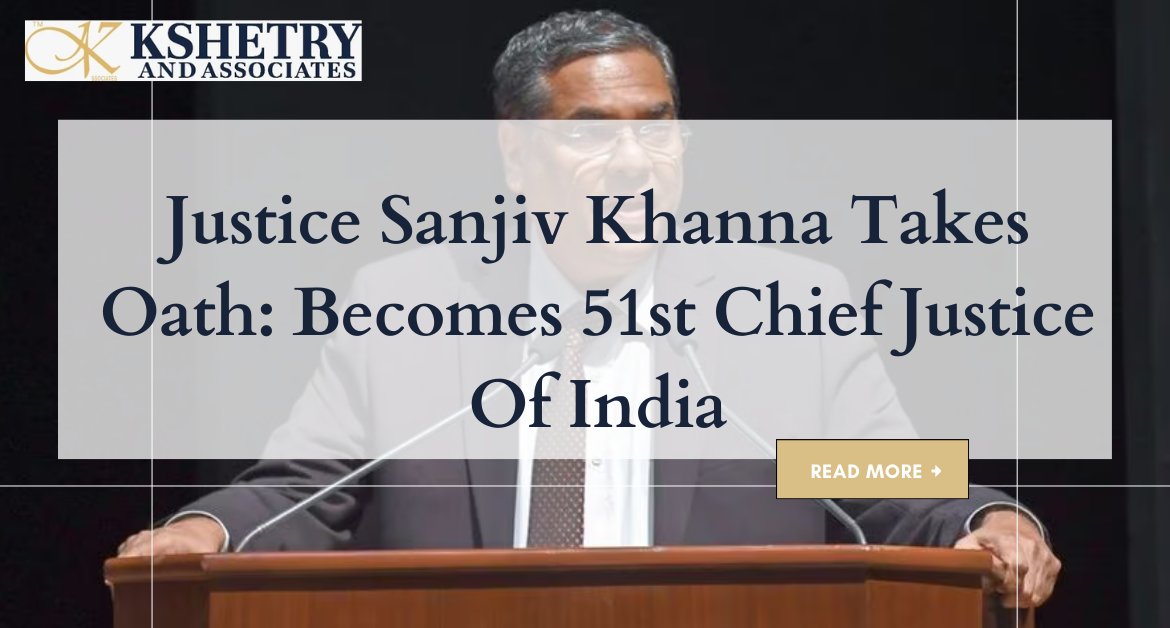On November 11, 2024, Justice Sanjiv Khanna was sworn in as the 51st Chief Justice of India (CJI) during a ceremony at Rashtrapati Bhavan. Droupadi Murmu, the president, administered the oath of office. Among the notable attendees were Prime Minister Narendra Modi, Vice President Jagdeep Dhankhar, Defence Minister Rajnath Singh, and former Chief Justice D.Y. Chandrachud.
Justice Khanna, who was born on May 14, 1960, will hold the position of Chief Justice of India for just over six months. He will retire at age 65 on May 13, 2025. Justice Khanna said that he will not move into the official CJI’s home at 5 Krishna Menon Marg because of the briefness of his term.
Meet Justice Sanjiv Khanna, The New Chief Justice of India
Justice Sanjiv Khanna has an impressive legal background and a series of landmark rulings that have shaped Indian law. Known for his principled judgments and deep commitment to constitutional values, Justice Khanna is expected to bring a significant impact on the Supreme Court’s future jurisprudence. Coming from a family of renowned lawyers, Justice Khanna is the nephew of Justice H.R. Khanna, who famously dissented in the ADM Jabalpur case during India’s Emergency, defending the right to life and personal liberty. Justice Khanna’s own career reflects a similar dedication to protecting fundamental rights and ensuring justice across multiple domains.
Justice Khanna’s journey to the Supreme Court began with his appointment from the Delhi High Court in January 2019. Since then, he has been involved in some of the nation’s most pivotal cases, including his affirmation of electronic voting machines (EVMs) as a secure method of voting to combat booth capturing and illegal voting, rejecting a shift back to paper ballots as unnecessary.
He was also part of the five-judge bench that upheld the abrogation of Article 370, abolishing Jammu and Kashmir’s special status. Additionally, he authored a notable judgment extending the Right to Information (RTI) Act to cover the office of the Chief Justice of India, promoting judicial transparency.
Justice Khanna Succeeds Justice Chandrachud
Justice Khanna has succeeded Justice Dhananjay Yashwant Chandrachud, who retired on Sunday following an illustrious tenure. Justice Khanna’s appointment as the 51st Chief Justice of India was officially confirmed through a notification issued by the Government of India. Acting under clause (2) of Article 124 of the Indian Constitution, the Ministry of Law and Justice announced that the President had appointed Justice Khanna to the country’s highest judicial position, effective November 11, 2024.
Notable Judgments and Upcoming Challenges
Justice Khanna has a rich portfolio of rulings that include family law, political, and financial cases. Among his notable judgments, he ruled that irretrievable breakdown of marriage could be a valid ground for divorce under Article 142 of the Constitution, allowing the Supreme Court to dissolve marriages in exceptional circumstances where reconciliation is deemed impossible. He also led a bench that dismissed petitions challenging advocate Lekshmana Chandra Victoria Gowri’s appointment to the Madras High Court, underscoring that the judiciary operates with awareness of all relevant information.
Justice Khanna’s role as CJI involves addressing politically sensitive cases, including pending bail applications in the Delhi liquor policy case involving Aam Aadmi Party (AAP) leaders Arvind Kejriwal and Manish Sisodia. His bench granted interim bail to Kejriwal and raised significant questions for the Enforcement Directorate, eventually leading to the release of AAP leader Sanjay Singh.
Furthermore, he will oversee critical cases such as the constitutionality of the Election Commission Appointments Act, 2023, which has raised concerns about the independence of election oversight, the ongoing challenge to marital rape laws in India, and the Bihar caste census.
Justice Khanna’s docket also includes pressing matters like arrest protocols under the Prevention of Money Laundering Act (PMLA) and the retrospective taxation dispute affecting the e-gaming sector. Notably, he will preside over an antitrust lawsuit against Google, assessing Android’s market influence, and a suo motu case on safeguarding doctors following a horrific assault on a trainee doctor in Kolkata. Through his legacy of landmark judgments and his principled leadership as CJI, Justice Sanjiv Khanna’s tenure promises to have a lasting impact on Indian law, addressing contemporary issues in family, political, and constitutional domains.
Despite his short tenure as Chief Justice of India, Justice Khanna’s vast expertise and important contributions to the court are anticipated to have a long-lasting effect on the legal system.
Also Read: GDPR vs. India’s Data Protection Laws: Key Differences and Compliance Tips

